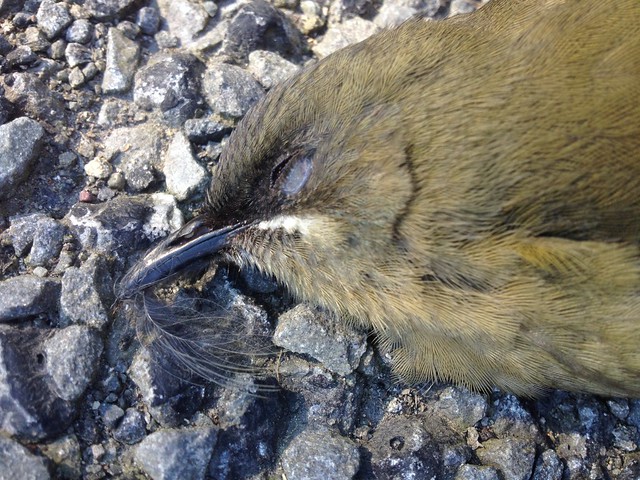RECENT ARTICLES
- CEBRA: An optimised and standardised sampling protocol for BioBlitz
- Stop it people, the plural of anecdote IS data!
- That's no pollinator, that's a flower visitor
- Add a scale to your macro photos
- What to photograph when counting the wild
- Imagine counting the wild on EVERY street in a city!
- My wild counting workflow
- A butterfly flew through
- Why iNaturalist observations without photos can be research grade
- Why you shouldn’t use a spreadsheet for data entry
- All articles ...
My first roadkill bellbird, after 11 years of counting
Oddly, it’s a sign that things are getting better for bellbirds in the environment of Christchurch, New Zealand
written Sep 3, 2014 • by Jon Sullivan • Category: Wild Changes

Since 2003, I have been noting the roadkill I see on my bike ride to work from southeastern Christchurch to Lincoln. I wrote about that on in this article. The bird community in this urban and rural NZ landscape is dominated by naturalised birds, mostly European species introduced here by the early British settlers. The roadkill reflects this.
The most common birds I see dead on the road are blackbirds, house sparrows, song thrushes, and goldfinches, all European natives and abundant in urban and rural Christchurch. Endemic NZ birds are relatively rare.
I’ve occasionally found roadkill fantails/piwakwaka and grey warblers/riroriro. Today, eleven years later, sadly, I found my first roadkill bellbird/korimako, a female.

While it’s sad to find a bellbird dead on the roadside, one bird in 11 years suggests that cars are a negligible source of mortality for these birds. Rather, it underscores just how rare these birds still are in urban and rural Christchurch relative to the ubiquitous European immigrants.
Bellbird numbers in Christchurch are increasing though, thought to be a result of a combination of the ongoing regeneration and restoration of native forest on the Port Hills and the extensive control of mammalian predators carried out in those forests, especially by the Christchurch City Council rangers and the volunteers of the Summit Road Society.
Perhaps I won’t need to wait another 11 years before I find another dead bellbird on the roadside. Strangely, that could be a good thing for Christchurch bellbirds.